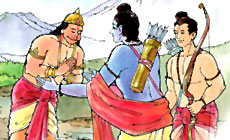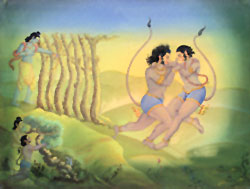In Hindu mythology Sugreeva was the younger brother of Vali, and the ruler of the kingdom Kishkindha. In some legends Sugreeva is depicted as son of Surya, the sun God. As the leader of monkeys Sugriva helped Rama to search and liberate his wife, Sita from the captivity of Rakshasa king Ravana.
Another legend says that Sugreeva is the son of Ahalya and Indra. Ahalya was the beautiful wife of Sage Gautama. Lord Indra and Surya came in the guise of sage Gautama and they had union with Ahalya. Ahalya had two sons, Sugreeva and Vali, who came from Indra and Surya respectively. At first they both were human beings but as soon as sage Gautama came to know that they were not his sons he threw Vali and Sugreeva in oceans and cursed them to turn into monkeys.
Vali ruled the kingdom of Kishkindha to the subjects of Vanara or monkeys. Tara was his wife and Sugreeva was his brother. At first the two brothers were very closed to each other. One day, a raging demon came to the gate of the capital and challenged Vali in a fight. Vali accepted the challenge but as soon as he proceeded towards the demon it was afraid and flew away in a deep cave. Vali entered the cave chasing the demon and asked his younger brother Sugreeva to guard the entrance of the cave. Sugreeva waited there for a long time but nobody came out.
Instead Sugreeva could hear great roar of the demon and the blood oozed out from the mouth of the cave. Sugreeva with a heavy heart concluded that his bother Vali had died in the battle and sealed the mouth of the cave by rolling a boulder. He returned to the Kishkindha and gave the news to other monkeys. He then took the charge of the kingdom as the ruler. But Vali was alive and conquered the battle. When ultimately he could return home he found that Sugreeva had become the king of Kishkindha. Vali decided that his brother Sugreeva had betrayed him. Though Sugreeva humbly tried to explain everything but Vali was not ready to listen anything. As a result he banished Sugreeva from Kishkindha and the two brothers, who were once good friends, became enemies.
 In exile, Sugriva met Shri Rama, who was the avatar of Vishnu. Rama was searching for his wife Sita who was kidnapped and captivated by Ravana, the demon king of Lanka. Sugreeva joined Rama in quest of Sita. Rama promised in return that he would kill Vali and would re-enthrone Sugreeva as the king of Kishkindha.
In exile, Sugriva met Shri Rama, who was the avatar of Vishnu. Rama was searching for his wife Sita who was kidnapped and captivated by Ravana, the demon king of Lanka. Sugreeva joined Rama in quest of Sita. Rama promised in return that he would kill Vali and would re-enthrone Sugreeva as the king of Kishkindha.
Rama and Sugreeva went for Vali. Rama stood back while Sugreeva accused Vali for taking over his wife and kingdom and challenged him in a fight. The two monkey brothers, Vali and Sugreeva rushed to each other, fighting with trees and stones and with fist, teeth and nails. They both look alike and indistinguishable in the eyes of the observer. So Sugreeva`s counceller Hanuman stepped forward and put a garland of flowers around Sugreeva`s neck. Rama then could easily distinguish Vali and killed him by driving an arrow through Vali`s heart. When Vali had expired Sugreeva married his widow Tara and anointed in the throne of Kishkindha.
 Sugreeva sent his most trusted companion Hanuman to find Sita. Hanuman returned with the news that Ravana, the demon king had captivated Sita in his island fortress of Lanka. When Rama decided to set for Lanka, Sugreeva also joined him along with his monkey-army to help him. When the army reached the seashore they built a special bridge across the sea to reach Lanka. The army also protected Rama in his citadel. After the great battle, Rama killed Ravana and Sita was liberated.
Sugreeva sent his most trusted companion Hanuman to find Sita. Hanuman returned with the news that Ravana, the demon king had captivated Sita in his island fortress of Lanka. When Rama decided to set for Lanka, Sugreeva also joined him along with his monkey-army to help him. When the army reached the seashore they built a special bridge across the sea to reach Lanka. The army also protected Rama in his citadel. After the great battle, Rama killed Ravana and Sita was liberated.
During the battle Sugreeva almost died when he decided to face a Rakshasa Kumbhakarna, the brother of Ravana. Sugreeva attacked the demon with the trunk of the Sala tree. The tree merely broke over Kumbhakarna`s head. The demon then caught hold of Sugreeva and dragged him off. He was sure to kill him but Rama`s brother Lakshman interfered and saved Sugreeva`s life.












